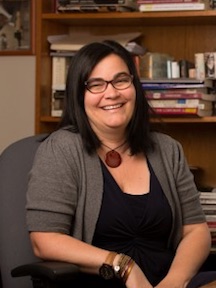By Benjamin Purper
As a historian of popular culture, Kathleen Feeley has spent a lot of time studying Hollywood. But even after studying the breadth of cinematic history, Feeley believes that the 2018 Golden Globes ceremony in particular was unprecedented for its display of female solidarity and activism.
“It was pretty extraordinary,” Feeley said of this year’s Golden Globes, where virtually every female celebrity wore black in support of the Time’s Up movement to end sexual assault and harassment against women. In a phone interview, Feeley noted that while celebrities have used the awards as a platform for causes in the past before, “there has been nothing on the scale that fundamentally challenged the red carpet as it exists [until now].”
In addition to the red carpet, Feeley also pointed to another historic moment in Hollywood history from January’s Golden Globes: Oprah Winfrey’s acceptance speech for the Cecil B. DeMille Award.
“That speech was so important for so many reasons because it was really talking about a very big picture,” she said, “and the way in which this is the beginning of a much larger process of really dealing with centuries of workplace harassment and assault.”
Feeley also appreciated how Winfrey’s speech referenced a much older sexual assault case than the wave of recent #MeToo allegations: the assault case of Recy Taylor in 1944.
“The case was important because Rosa Parks, who people think of as like a tired seamstress, was a long-time civil rights activist. And the Recy Taylor case was one of the many cases she worked on,” she said.
When asked if Winfrey’s inspirational speech placed her in a leadership position with the Time’s Up movement, Feeley wasn’t sure. She pointed out that the movement is organized collectively, without a single leader, but that the speech certainly gave Winfrey a kind of symbolic leadership.
“Causes often need, to be successful, a charismatic leader like Martin Luther King, Jr.,” Feeley said. “Will Oprah turn into that? I don’t know, because she’s also a businesswoman. So, is she ready to get that radical?”
Feeley also spoke about the value she places on liberal arts education. She graduated Phi Beta Kappa from Colgate University in 1990 with degrees in history and women’s studies, and went on to get a Ph.D. in U.S. history and women’s studies from the City University of New York.
Being inducted into Phi Beta Kappa was the start of Feeley’s lifelong involvement with the organization. “It’s always been, with the exception of my B.A. and my P.h.D., one of the most significant academic honors that I’ve received in my career,” she said.
Feeley says that liberal arts universities like the University of Redlands, where she teaches, are great incubators for students to later join Phi Beta Kappa. She currently directs the Proudian Interdisciplinary Honors Program at Redlands, which she says teaches the breadth of subject matter inherent to liberal arts education.
“It’s another one of these kinds of spaces where you see students becoming really well-rounded speakers, thinkers, writers to prepare themselves for whatever comes next,” she said. “They’re not being trained in a very sort of deep, vocational way in the event that vocation doesn’t work out.”
From a historical perspective, Feeley notes, “the liberal arts have been undersold since their creation. Give me a date and I can find you an article talking about the death of the liberal arts college, the liberal arts ethos,” she said. “It’s sort of always imperiled. That narrative is a constant refrain and we just have to keep pushing back against it.”
According to Feeley: “It’s never been more clear how important it is that we educate citizens who can judge for themselves the quality of the news they are reading.”
Benjamin Purper graduated Phi Beta Kappa from the University of Redlands in 2017, having majored in international relations with minors in music and Latin American studies. University of Redlands is home to the Xi of California Chapter of Phi Beta Kappa.




